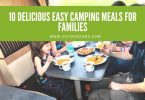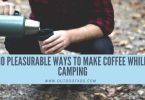We may receive commissions when you buy through the links on our site. Full Disclaimer.
Are you new to camping? Are you looking forward to your first camping trip? You need not worry at all. We’ll show you some important tips for first-time campers.
These tips will allay your fears, make your first and subsequent camping trips a much more enjoyable event.
1. Pick a campsite that is close to your home.
As a first-time camper, you should avoid campgrounds that are far away from your home. Search for campsites that are closer to you.
You might get to the campsite only to realize that you aren’t enjoying yourself. It’s easier to pack up and head back home if you stay at a campsite close to your home.
Also, your tent might have issues. The weather might get bad. Other things could also happen on the trip. So, it would help if you camped close to your home for the first few camping trips.
2. Try out a private camping facility with several facilities.
You can try out campgrounds with facilities like hot showers, electricity, cement floors, and more for your first trip. This will help you adapt better to the outdoors. On your subsequent trips, you can head out to other campgrounds other than the lush camping facilities.
3. Take time to get familiar with your camping gear at home.
Many new campers often make the mistake of getting to the campsite before familiarizing themselves with their camping gear. Some might waste so much time trying to set up their tent only to end up spending the night in an unsafe, unbalanced tent.
Spend some time in your backyard or living room, setting up your tent and acclimatizing yourself with all your camping equipment.
Check all tools and ensure that they work properly. Replace or adjust anything that doesn’t work as it should before you head to the campsite. You have the luxury of asking other experienced campers or scouring the internet for help before leaving home.
4. Buy a tent that is large enough.
First-time campers often make the mistake of buying a tent that is smaller than what they need. They often calculate their body size alone and underestimate the size of luggage that they are bringing along with them.
Go with a tent that is larger than what you think you need. If you are planning a family camping trip for four people, go with a family camping tent that can accommodate six people comfortably.
5. Learn the ins and outs of your RV beforehand if you’ll be driving one
If you drive your RV to the campground, you need to spend a lot of time with your RV beforehand. Learn how to back it up, dispose of waste, and carry out basic repairs.
6. Have a camping checklist
Camping checklists are important. It prevents you from forgetting items. It also helps you to stay organized.
A checklist will contain all the items to pack and a list of tasks to finish before heading to the campsite. Tick each item off the list as you accomplish or pack them.
7. Get to the campground early.
If you are a first-time camper, you’ll likely be unfamiliar with the campground rules and regulations. You might also be unfamiliar with water arrangements, hot showers, waste disposal, electricity, etc.
Getting to the campground s will help you get acclimatized with the place’s setup and layout. Arriving at the campground early during the peak camping period will help you get a favorable spot.
You arrive there early during daytime hours, which gives you enough light to set up your camping tent and gear.
8. Buy your food and other produce one or two days before departure
If you don’t buy your food ahead of your camping trip, you might forget to buy some food items. Don’t postpone it till the day of the trip, or you might not find everything you need. You might also forget to buy some items.
If you buy your camping food too long before you are prepared to head to the campground, you might end up with stale food that isn’t fresh. One or two days before is okay.
Buy more canned and dried food. These last longer in the outdoors and won’t get spoilt quickly, unlike fresh meat and other foods.
9. Take time to plan your meals.
Many new campers make the mistake of arriving at the campground with just any amount of food without calculating what they’ll need.
Plan the number of meals you’ll be eating per day, the number of campers, and the serving size per person. This will help you bring along the right quantity of food with you on the camping trip.
ALSO SEE:
10 Delicious & Easy Camping Meals for Family
10 Amazing Kid-Friendly Camping Meals
3 Quick and Easy Meals to Prepare in Your Camping Trips
Camping Food List For A 3 Days Trip
10. Follow the rules and regulations at the campground.
All campgrounds have their rules and regulations. Ensure that you keep and adhere to them. There are rules on noise at certain hours and privacy regulations. Respect the rules and respect yourself.
Don’t invade the privacy of other campers, and keep your area tidy. This is an important tip for first-time campers.
11. Go with enough clothing.
You might get to the campsite and find out that the weather suddenly turned hotter or colder. Go with spare clothing to protect yourself better.
Also, your clothes might get dirty when carrying out outdoor camping activities. Most campgrounds do not have laundry facilities.
12. Avoid camping under severe weather conditions.
For your first few camping trips, avoid going under severe weather conditions. Camping isn’t fun when you have to lie in your tent for days while waiting for the rain to subside. Even when the rain is over, you won’t have so much fun hiking under mud-filled trails.
Check the weather forecasts and postpone the trip till when the weather is better.
13. Go along with first aid and emergency kits.
Prepare for the eventuality of cuts, rashes, blisters, and any other minor injury. Bring along a first aid kit containing insect repellent, plasters, bandages, paracetamol, sunscreen, balm, methylated spirit, and other essentials.
You should also have an emergency kit containing items like a torch, a compass, a utility knife, etc.
14. Do not setup your campfire too close to your tent.
Avoid setting up your campfire too close to your tent to prevent fire accidents and other mishaps. You don’t need your campfire for warmth when you are asleep in your tent. There are other better and more efficient ways to warm up yourself.
Douse the fire before you go to bed. Never leave a campfire unattended.
15. Avoid eating fruits and drinking water from the outdoors.
Get your water from only clean and recognizable sources like the campground potable water supply system. When you are going hiking, do not drink water from rivers and other sources you come across. Fill up your water bottle with clean water before leaving the campground.
Avoid eating berries, fruits, mushrooms, and other plants that you come across around the campsite. You are new to camping, and not everything that seems eatable is edible. Read 10 Incredibly Safe Berries to Eat In The Wild and How to Identify Poison Berries
Conclusion
The tips listed here will make your initial camping trip much better. If you adhere to them, you’ll find out how much interesting camping could be.




